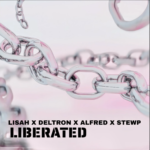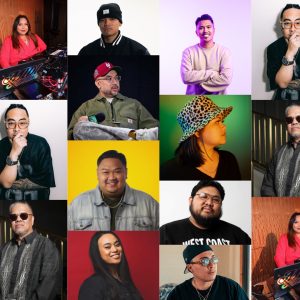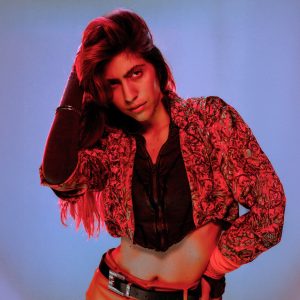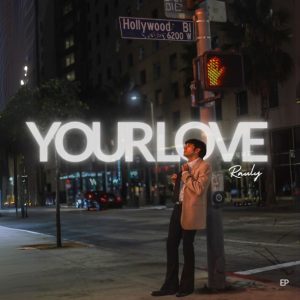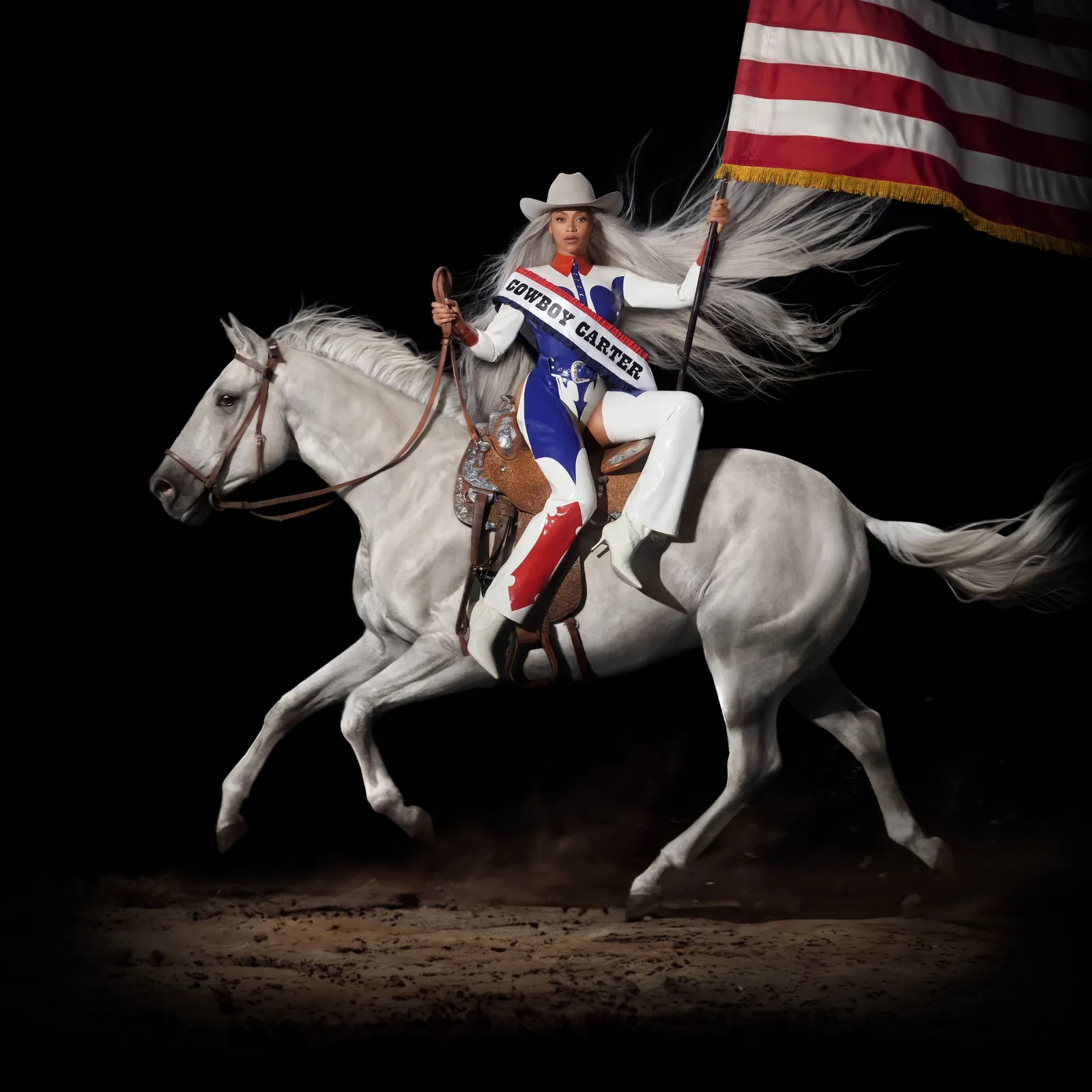
Album Review: Cowboy Carter – Beyoncé
“There’s a lot of talking going on/While I sing my song/Can you hear me?” Beyoncé sings on album opener, “Ameriican Requiem.” The song sounds like the beginning of a Western-epic: a languid desertscape filled with guitar strums, vintage synths, and dazzling harmonies. Beyoncé’s voice is low and intent on laying down the law. Here, she sets the stage by addressing the criticism of her performing country music: “Used to say I spoke too country/And the rejection came, said I wasn’t country ‘nough.” As a Texan with familial connections to Alabama and Louisiana, Beyoncé shifts the perspective saying that she’s always been country, and maybe too country. It is here we saddle up and begin our journey alongside the self-proclaimed Cowboy Carter.
Cowboy Carter is Beyoncé’s latest album, and the second act of a promised trilogy following the 2022 dance opus, Renaissance. With the release of “Texas Hold ‘Em” and “16 Carriages” as singles, this was looking to be Beyoncé’s first full fledged voyage into the country music realm. According to Beyoncé herself, Carter has been in the making for five years, and comes as a response to the backlash she received from her 2016 CMAs performance. In her statement, she explains how she delved into the history of country music in order to inform the making of the record. After journeying through Cowboy Carter, it is clear Beyoncé has done her research as she takes us from the club to the rodeo.
Interestingly, Beyoncé proclaimed: “This ain’t a country album. This is a ‘Beyoncé’ album.” And she’s right. It’s something so much better than just a country album: Beyoncé presents us with an expansive auditory landscape of American Western music. She does not constrict herself to the confines of the “country” music genre. Instead, this is a cornucopia of musical styles that draws from various regions of the South which she then places her trademark touches on. At once it all sounds so familiar, yet something so fresh, exciting, and experimental.
This grand excursion of Western sounds is filled with many places and genre styles. Beyoncé gives us folk, country balladry, rock ‘n’ roll, yacht-rock, trap, rap, opera, honky-tonk, gospel and everything in between. This is music that covers the Southern region of this country: Texas, Alabama, Louisiana, Oklahoma, and even California.
We take a gander at the honky-tonk hoedown scene with the infectious “Texas Hold ‘Em” and head over to the rodeo circuit on “Sweet★Honey★Buckiin’.” On “Alliigator Tears,” we go down to the swamp and hear the most intoxicating, sweet-as-molasses harmonies on the record. “Bodyguard” is a breezy ‘70s soft-rock number that sounds like taking a road trip along the sunny California coast. We’re then hoisted to the desert sands on the all-too-short “Desert Eagle,” an erotic interlude that has a bass groove sexy enough to satiate anyone’s desires. We then end up in the dark, smokey bars of a Western town on “Daughter” as she laments about her loneliness and being as cold as “Titanic waters.”
This trek through Cowboy Carter is shaped by interludes which feature appearances by Willie Nelson and Linda Martell. The country music legend Nelson plays a radio host for KNTRY Radio Texas on the “Smoking Hour” interludes. As he states, he’s here to turn you on to some “real good shit.” Martell, a black female country music artist and the first to perform at the Grand Ole’ Opry, appears as an announcer. She comments on the “funny little concept” of genres and how they can restrict an artist to a certain space in their art. Together, these two legends add a layer of country music history and a foundation from which Beyoncé creates her vision.
Beyoncé isn’t alone on this journey through Western and country sounds. Dolly Parton appears before a cover of “Jolene” as a sort of blessing from country music royalty. On the cover of the Beatles’ folk song, “Blackbird,” she sings along with the voices of black female country artists including: Tanner Adell, Brittney Spencer, Reyna Roberts, and Tiera Kennedy. Together, these singers give power to the song’s message especially given its roots in the Civil Rights movement. Also, there are duets with Miley Cyrus (“II Most Wanted”), Post Malone (“Levii’s Jeans”), and Willie Jones (“Just for Fun”).
Perhaps the most interesting collaboration comes when Beyoncé taps in Shaboozey, a country rapper from Virginia, for an assist on “Spaghettii” and “Sweet★Honey★Buckiin’.” Together, these songs present a sound that is genre-less and innovative. A sizzling southern trap beat underscores Beyonce’s ferocious bars on “Spaghettii” while Shaboozey plays with the idea of being the cowboy outlaw. “Sweet” is an experience that interpolates Patsy Cline’s “I Fall to Pieces” while also incorporating a Jersey club beat that keeps it bouncing (like a mechanical bull).
Unsurprisingly, the star of this rodeo show is Beyoncé’s wide-ranging vocal performance. Yet, here, she’s charting new territory. “II Hands II Heaven” and “Amen” contain heavenly harmonies and some of her most gorgeous vocal work to-date. On the dark and mysterious “Daughter,” she even takes things up a notch when she performs a verse from “Caro Mio Ben” in full operatic fashion. It’s an angelic and stunning feat. On the album highlight, “Ya Ya,” Beyoncé puts on a show in full Tina Turner fashion. Her voice commands your attention as she lets the grit and gravel take over. The performance is unrelenting and Beyoncé makes it sound easy. Just from listening you can’t help but to feel out-of-breath yourself!
After venturing through American musical landscapes, you have experienced something more than just a country album–you have experienced a Beyoncé album. Cowboy Carter is a synthesis of the vast musical history of the South, and a lesson in the often overlooked origins of country and Western music in black music. Beyoncé presents us with a rich survey of sounds that have come up from the South, and makes it into something entirely her own–just like she did with dance music on Renaissance. Carter is rich with history. It’s nostalgic, yet forward-looking. Kaleidoscopic and inclusive. It’s a powerful statement that helps to reframe cultural perspectives on what country music means while still giving its listeners a boot-strappin’ good time.

